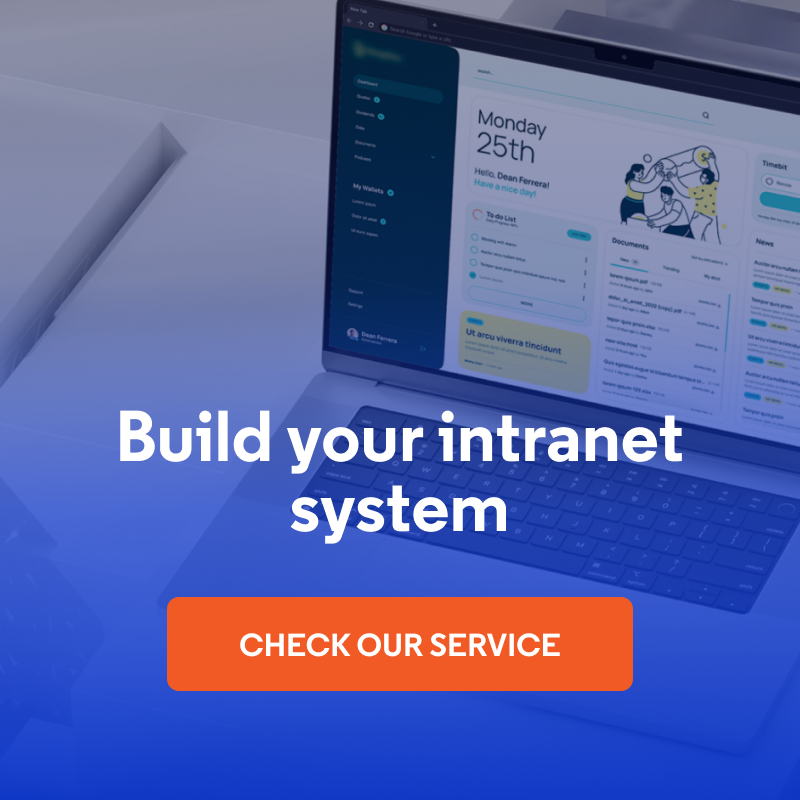
The "Must Read" Feature in Open Intranet – How to Effectively Communicate Workplace News?
Have you ever sent an important announcement to the entire company, only to discover that most people didn't read it? Or distributed critical information about security or regulatory changes and heard from employees, "I didn't see that message"? The "Must Read" feature in Open Intranet solves this problem once and for all. In this article, I’ll show you how this tool works and how to use it. I invite you to read the blog post or watch an episode from the “Nowoczesny Drupal” series.
In this article:
- The headache of HR and internal communication departments
- What is the "Must Read" feature and how does it work?
- The "Must Read" feature in Open Intranet - practical demo
- Business benefits of the "Must Read" feature
- Technical implementation in Drupal – step by step
- The "Must Read" feature for workplace news - summary
The headache of HR and internal communication departments
In most companies, effectively informing employees is the biggest challenge for internal communication and Human Resources departments. Even the most important messages can get lost in the flood of daily news. Employees often don't know which messages require immediate attention and which can wait.
Additionally, there is no way to track who has read important workplace news. This is particularly problematic during a crisis when everyone needs to be notified quickly of changes to safety rules, new procedures, or management decisions.
The result is inefficiency and frustration on both sides—among employees and HR departments—and sometimes even serious business consequences. Fortunately, the "Must Read" option in Open Intranet is an effective solution to this internal communication problem.
What is the "Must Read" feature and how does it work?
"Must Read" is a feature available in Open Intranet that allows you to mark the most important workplace news as mandatory reading. It works very simply but effectively:
- Editor: the editor checks the "Must Read" box when publishing a news item, marking the message as important and mandatory to read.
- Employee: the user clicks the "Mark as Read" button located below the message to confirm that they have read the content.
- System: the system tracks who has and hasn't read the message, saves confirmations, and generates reports available to the editor.
Importantly, the editor has access to a complete list of people who have and haven’t read the messages. They can also send an automatic e-mail reminder to employees who haven’t confirmed that they have read the message.
This simple tool prevents important information from getting lost in the flood of daily content. It also allows you to ensure that all employees read it.
Key advantage – ready to use right away
The "Must Read" feature is already implemented in the Open Intranet system. There is no need to click anything, install additional modules, or ask programmers for implementation. You can start using the ready-made intranet software right away.
The "Must Read" feature in Open Intranet - practical demo
In practice, using the "Must Read" feature is very intuitive.
"Must Read" from the perspective of the editor and user
When an editor creates a new workplace news item, they have an additional "Must Read" option available. This is actually the only thing they need to do when creating or editing an article – select the checkbox.
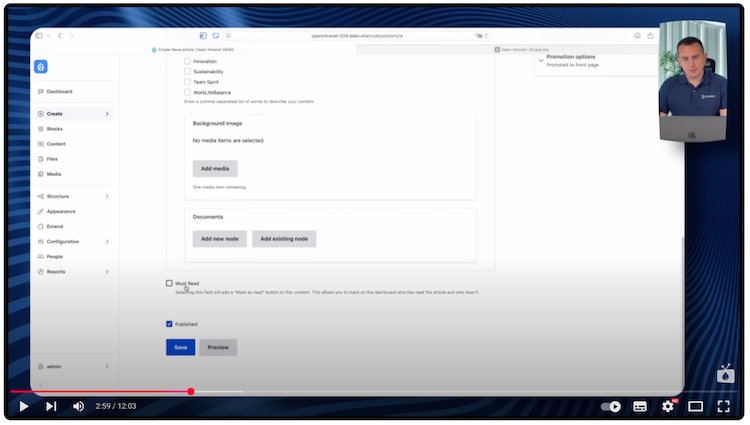
For regular users, the process is equally simple. After logging into the system and going to the news item marked as "Must Read," the user sees a "Mark as read" button.
This button only appears for workplace news items that have been marked by the editor as requiring confirmation of reading. After clicking the button, the system records that the person has read the content.
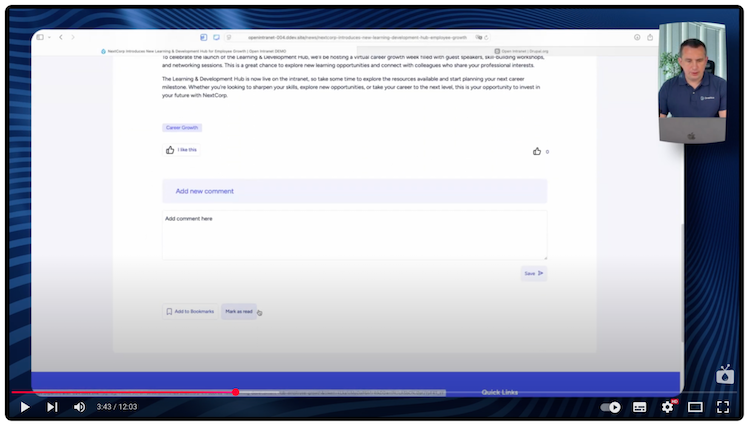
Dashboard with reports – better control for editors
In Open Intranet, editors have access to a special dashboard with an additional "Must Read Report" tab:
Home > Administration > Dashboard > Must Read Report
All content with the "Must Read" checkbox selected is displayed there. The panel shows how many users clicked "Mark as read" for each message.
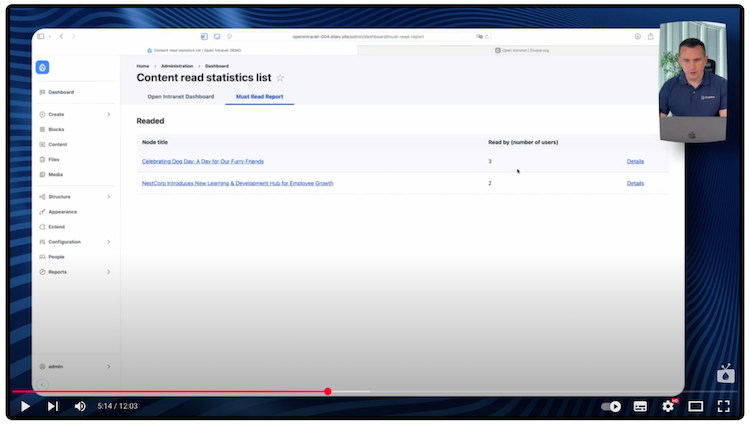
Additionally, clicking "Details" provides a detailed view showing exactly who marked the message and when. This report also includes a complete list of users who haven’t yet confirmed that they have read the company news.
Email reminders – effective enforcement of workplace news
The system also offers a useful mass reminder sending feature. At the bottom of the panel, there is a "Send a reminder email" button that lets you send an email to all users who haven’t yet read the message.
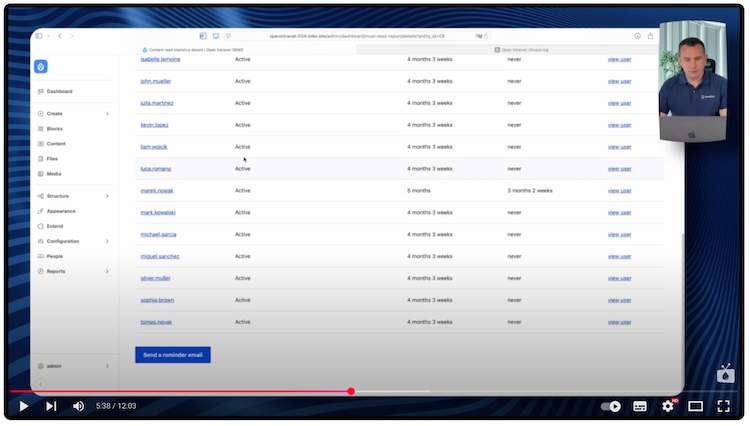
You can select all or some of the users, write an email subject line and reminder text with a link to the article, and send notifications with a single click.
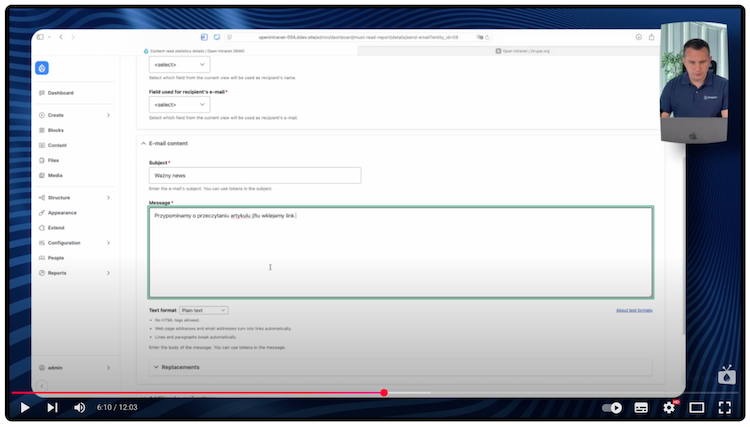
You can repeat the entire process of sending reminders as needed. After a few days, the person responsible for communication can check who hasn’t yet read the information and send reminders again. If several emails don’t work, you can send individual messages or even call specific people. This ensures effective communication.
Business benefits of the "Must Read" feature
Implementing the "Must Read" feature provides your company with measurable benefits. The HR and internal communications departments can be sure that all important information has reached all employees, and they also have accurate knowledge of who has not yet read the message. This eliminates the risk of oversights and allows for effective enforcement of key content delivery.
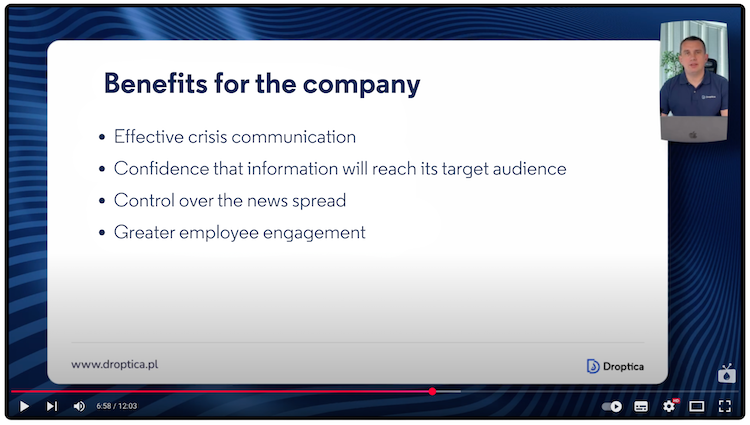
In addition, the system allows you to monitor the speed at which messages spread throughout the organization. The editor can check daily – or even every few hours – how many employees have already read the message and how many haven’t. This provides the organization with practical data that helps enhance communication within the company, analyze its effectiveness, and draw conclusions for the future.
Technical implementation in Drupal – step by step
For those interested in the technical side or who want to customize the system to their needs, it’s worth explaining exactly how this feature works. Two modules that are part of the Drupal core – Field and Views – were used to create it, and the Flag module was also installed. In addition, a small piece of code was added to the template, in the preprocess node function. Below, I describe the subsequent stages of this configuration.
Field – adding a field with a checkbox
In Structure → Content types → Manage fields, an additional boolean (checkbox) field was added – "Must Read."
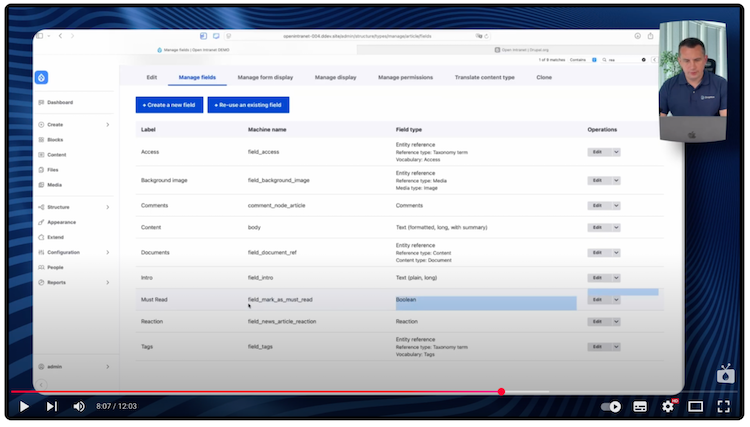
This allows the editor to mark a given news item as mandatory reading. In the form settings (Manage form display), the field has been placed at the bottom of the page, but it can be moved to a more convenient location at any time.
Flag – read mark configuration
The next step was to use the Flag module. A flag called "Read" was created in the system (Structure → Flags).
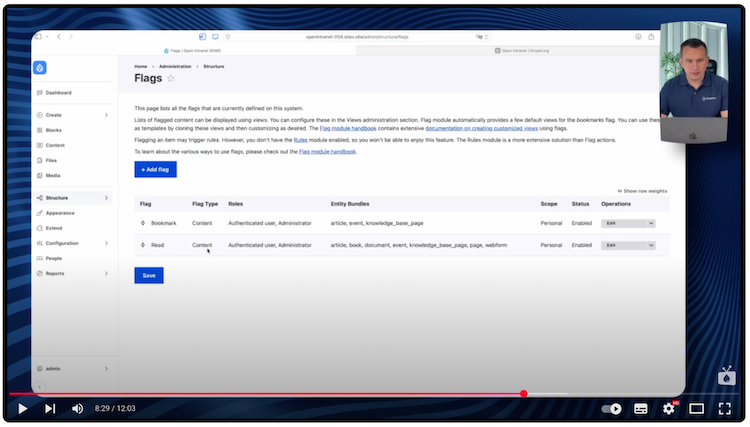
In Drupal, there may also be flags for other functionalities, but in this case, we’re interested in this one. Its configuration is very simple – just add labels and messages displayed after clicking and set additional options.
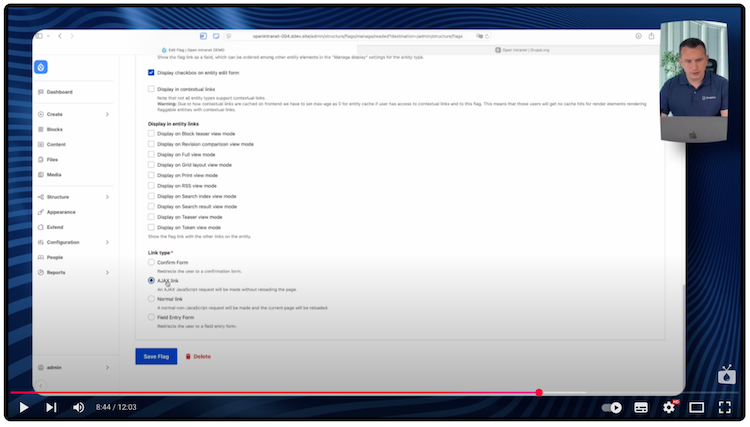
It’s worth noting that the "Mark as read" button that appears below the news item has been configured as an AJAX element. Thanks to this, when clicked, the page doesn’t reload entirely, and the information is saved dynamically and without disruption to the user.
Views – reporting and detailed views
The Views module (Structure → Views) was used to handle reports. Several different views were created:
- a view with a list of news items marked as "Must Read,"
- a detailed view (Details) that shows who has or hasn’t marked the news as read.
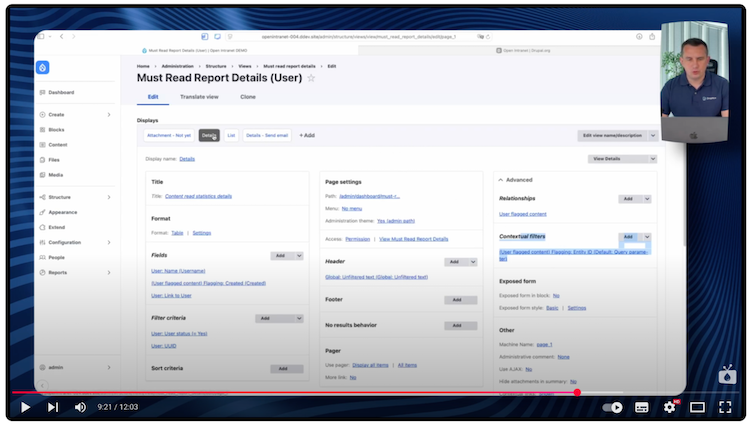
The configuration of views is based on the use of relations and contextual filters, which allows data to be filtered by specific news items. This allows the editor to check detailed information about a single message.
Views Send – sending email reminders
The Views Send module was used to enable the sending of reminders. It adds a special Global send email field to the view. This allows the editor to send an email to all or selected employees directly from the report.
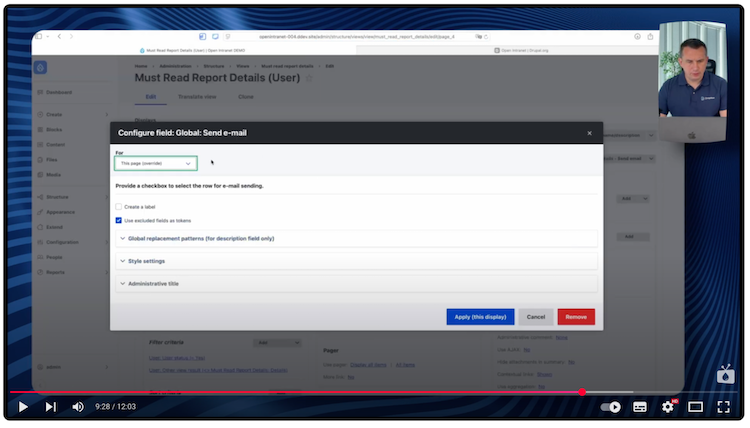
This module offers a wide range of possibilities: you can configure different views to send messages to email addresses available in Drupal.
Additional code in the template
The configuration is complemented by a small piece of code added to the template, in the preprocess node function. It’s responsible for the logic of displaying the "Mark as read" button only for news items with the "Must Read" checkbox selected.
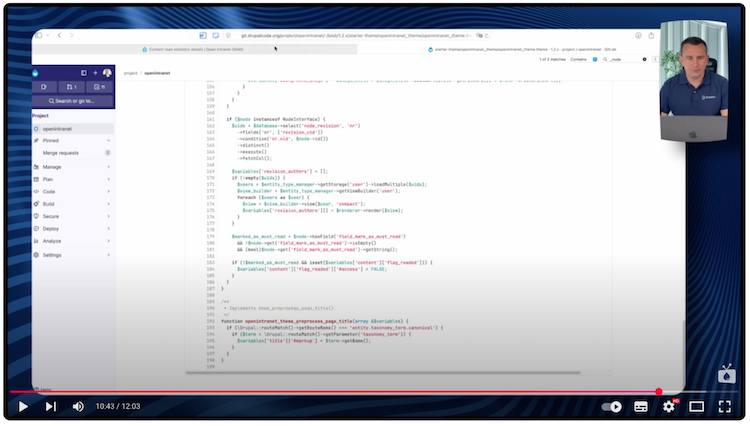
Configuration summary
In practice, the above configuration boils down to three elements:
- The "Must Read" news list view shows all content marked as mandatory.
- An additional detailed view filters users and shows who has read and who has not.
- The Views Send module allows you to send email reminders to people who have not yet clicked the button.
The "Must Read" feature for workplace news - summary
The "Must Read" feature in Open Intranet is a simple but extremely effective tool that significantly improves internal communication within the company. Thanks to it, HR departments can always be sure that their messages have reached all employees, and if necessary, they can send email reminders to those who haven’t yet read the message. This avoids the risk of key announcements being overlooked and ensures that the most important information doesn’t get lost in the flood of daily content.
This feature is available immediately after installation and doesn’t require additional configuration. It can be used immediately after the system is implemented. Open Intranet is a completely free solution, ready to use in any organization. If you want to see how it can improve communication in your company, check out our open source intranet.

